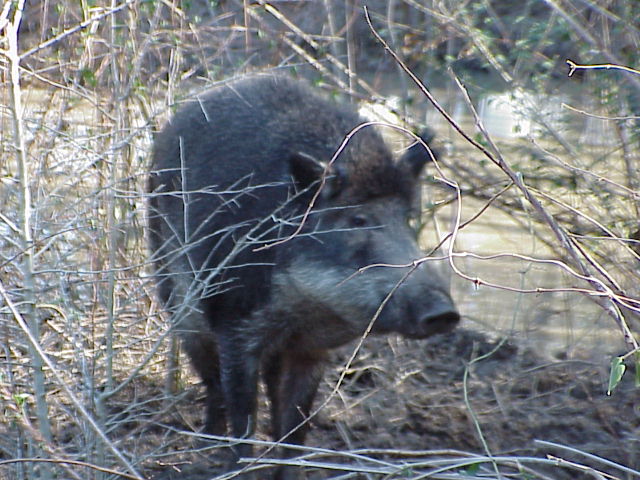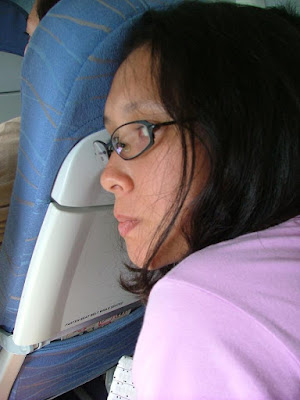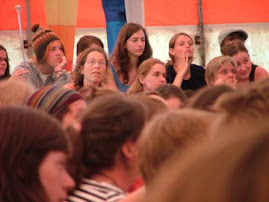Spent two days in a parish near Bukidnon and had the most fulfilling filming adventure to date.
Filmed all the animals on the farm - pigs, chickens, geese, goats, and worms. (The worms are kept in a special cage and are fed with all sorts of debris. These are then digested and the excrement used as compost.) When I left kanina, another animal had been added - somebody had dropped off a pregnant cow as a present.

Also got footage of a dead rat that drowned in a tub of rainwater.
(Last night, the roof was crawling with them. But I slept like I never slept before. That's because for the first time in a long time, there was no electricity and no noisy neighbors for miles around. Just rats. Better that than five radios blaring at the same time.)
This morning, Pards, the parish priest, Marites, the parish worker, I, and SM and Cutie, hiked for two hours to the parish's other farm-site. The trail we passed crossed seven springs/streams and was full of hoof prints of wildboar.
This morning, Pards, the parish priest, Marites, the parish worker, I, and SM and Cutie, hiked for two hours to the parish's other farm-site. The trail we passed crossed seven springs/streams and was full of hoof prints of wildboar.

In our trek back to the parish house, I almost stepped on what was a baby cobra hiding its head in the shrubbery.
To stick to the farm's organic concept, Pards collects the pigs' manure in a tank that's connected to another tank that turns the shit into biogas that's used to cook breakfast, lunch and dinner.
 The contraption cost some 100,000 pesos to build but that's small change for a lifetime of free gas.
The contraption cost some 100,000 pesos to build but that's small change for a lifetime of free gas.
Another attraction of the farm is the reservoir where all the springs in the property are collected in a cement box that is connected to a pipe that leads to a pump that uses gravity to keep the water flowing. This contraption cost 11,000 pesos to build but again, that's small change for a lifetime of unlimited water. Pards is now experimenting with a contraption that will utilize the unlimited water to generate electricity.
In between takes during chats about the Catholic church, I discovered that Pards is quite unconventional. Although he can easily ask his congregation to buy a car for the parish, he has not because he doesn't think a car is necessary. "If I have to transport fruits or vegetables or animals, I just rent a jeepney," Pards says. He points out that living like this suits him fine since he gets to help the owner of the jeepney and there's no need to spend on gasoline or pay for car repairs. Instead of a car, Pards is saving money to buy a weighing scale and more seedlings.
Living frugally like this is also because Pards has to contend with having to get by with only 3,000 pesos worth of collections every month. That's a stark contrast to many other parishes whose parish priests have made marriages, baptisms, confirmations, and what not, their bread-and-butter so to speak. For these parish priests, collecting a whopping 40,000 pesos a month is normal.
The catch is that for every mass, 1,000 pesos of the money collected during the "offering," goes to the priest as "honorarium." It's SOP Pards tells me. This is money for the officiating priest to keep and spend in any way he fancies. Perhaps you already know this but the Catholic church has a fixed price list for ALL the services it gives. Even a prayer request for a sick person, a dying person, as well as a prayer request to pass an exam - come with a price.
Pards wants to change this and not let the survival of the parish depend on money collections. Instead he sells the animals and plants that are grown in the farm and uses that money to buy things for the parish like prayer books, candles, etcetera. Pards has told the community in the area that in his parish, money offerings are not an obligation.
The animalscapade was a lot of fun; the plantscapade was as interesting. That's because Pards grows everything organic - passion fruit, carrots, strawberries, celery, rice, sorghum, etcetera. The plants feed on various kinds of foliar fertilizer-concoctions Pards makes from egg shells, banana bark, rice husks, molasses, ashes, and other gooey stuff stocked in barrels in the shed. These are rich in potassium, calcium, nitrogen, etcetera which make the plants grow big healthy and strong.
To stick to the farm's organic concept, Pards collects the pigs' manure in a tank that's connected to another tank that turns the shit into biogas that's used to cook breakfast, lunch and dinner.
 The contraption cost some 100,000 pesos to build but that's small change for a lifetime of free gas.
The contraption cost some 100,000 pesos to build but that's small change for a lifetime of free gas. Another attraction of the farm is the reservoir where all the springs in the property are collected in a cement box that is connected to a pipe that leads to a pump that uses gravity to keep the water flowing. This contraption cost 11,000 pesos to build but again, that's small change for a lifetime of unlimited water. Pards is now experimenting with a contraption that will utilize the unlimited water to generate electricity.
In between takes during chats about the Catholic church, I discovered that Pards is quite unconventional. Although he can easily ask his congregation to buy a car for the parish, he has not because he doesn't think a car is necessary. "If I have to transport fruits or vegetables or animals, I just rent a jeepney," Pards says. He points out that living like this suits him fine since he gets to help the owner of the jeepney and there's no need to spend on gasoline or pay for car repairs. Instead of a car, Pards is saving money to buy a weighing scale and more seedlings.
Living frugally like this is also because Pards has to contend with having to get by with only 3,000 pesos worth of collections every month. That's a stark contrast to many other parishes whose parish priests have made marriages, baptisms, confirmations, and what not, their bread-and-butter so to speak. For these parish priests, collecting a whopping 40,000 pesos a month is normal.
The catch is that for every mass, 1,000 pesos of the money collected during the "offering," goes to the priest as "honorarium." It's SOP Pards tells me. This is money for the officiating priest to keep and spend in any way he fancies. Perhaps you already know this but the Catholic church has a fixed price list for ALL the services it gives. Even a prayer request for a sick person, a dying person, as well as a prayer request to pass an exam - come with a price.
In other words, kung walay kwarta, puwede pud magoffer ug kamatis, papaya, bugas, and so forth. Kung dili kabayad ang mangunguma ug let's say, 100 pesos for getting her child baptized, walay kaso kung 20 pesos lang ang iyang ihatag. Pero kung wala jud siya'y ikabayad, okay lang gihapon. Kay unsa man intawon ang ikabayad sa pobre? That's typical Pards. His big dream is to help farmers go organic too - not just because it's less expensive but because it's a better, more healthy way of life for humans and the environment.
Mind you, Pards is also only the second priest I know who doesn't think there's anything wrong with women priests. (He even tells this during mass.) And get this: during pre-marriage counseling sessions, he gives the brides-to-be and the husbands-to-be advice on natural family planning and on artificial contraceptives. Pards reasons couples have the right to know both.
As this blog entry has already become so long, I would just like to wrap up with: I am glad that there are still priests like Pards who walk the talk and are very vocal about things which other priests might just be thinking in private but never really saying out loud for everyone to hear. So refreshing.



























2 comments:
awesome farm! i wish i could grow my own garden in the backyard. i'll try next summer.. siguro. :D
Nice post, Maya.
Post a Comment